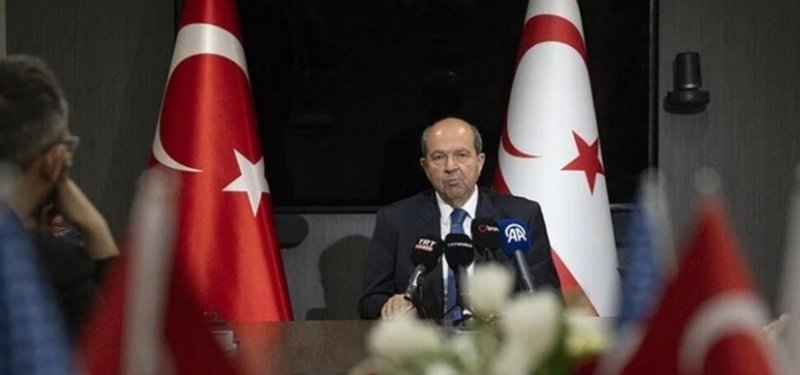
Turkish Cypriot president conveys frustrations to UN chief over embargoes, sanctions
"I took this opportunity to bring to the Secretary General's (Antonio Guterres) attention that the Turkish Cypriots are very frustrated about the embargoes and isolations still imposed on us by the international community, which is very unfair for the Turkish Cypriots to be obstructed and to be impeded from economic development and growth," Tatar said at a press briefing at UN headquarters in New York.
- Diplomacy
- Anadolu Agency
- Published Date: 11:57 | 05 April 2024
- Modified Date: 11:57 | 05 April 2024
Turkish Republic of Northern Cyprus (TRNC) President Ersin Tatar on Friday said he conveyed the frustration of Turkish Cypriots over the embargoes and sanctions to the UN chief.
"I took this opportunity to bring to the Secretary General's (Antonio Guterres) attention that the Turkish Cypriots are very frustrated about the embargoes and isolations still imposed on us by the international community, which is very unfair for the Turkish Cypriots to be obstructed and to be impeded from economic development and growth," Tatar said at a press briefing at UN headquarters in New York.
Tatar said during his meeting with Guterres that the Turkish Cypriots would not resume negotiations from where they left off in Crans Montana, Switzerland.
"All those opportunities have been exhausted and we have a new position obviously," he noted.
Stating that the UN Special Representative for Cyprus, Maria Angela Holguin's term has reached halfway, Tatar said Holguin is determinedly exploring for common grounds for both sides.
"Secretary General has confirmed that there is no sign yet that there is going to be a common ground," Tatar said, adding that they are in "full cooperation" with the special representative.
Tatar further emphasized that Turkish Cypriots are being disregarded by an "invisible hand" and attempted to be portrayed as part of the "Republic of Cyprus," stressing that it is "absolutely unacceptable."
- 'Turkish Cypriots have been basically unfairly treated'
He recalled that Turkish Cypriots were the "co-founders" of the "Republic of Cyprus" in 1960, as he called on international community to "wake up to the reality that they are two people's, two Democratic states, two authorities" on the island.
Responding to Anadolu's question on years-long embargo and isolation imposed on Turkish Cypriots, Tatar said the UN chief is "very sympathetic. He knows Turkish Cypriots have been suffering, and it's very unfair. Turkish Cypriots have been basically unfairly treated, and he is aware of this."
Recalling the UN's pledge to ease the embargoes if the Turkish side supported the Annan Plan 20 years ago, Tatar noted that the Greek Cypriots were "awarded" with EU membership after rejecting the plan, while the UN "didn't keep their word to Turkish Cypriots. We still are under embargoes and isolations."
Emphasizing that the Turkish Cypriots cannot be forced in to a solution, Tatar said, "We are not alone. I said this to the Secretary General again, today. Republic of Türkiye is with us. We have full support of Türkiye."
He further said that a two-state solution must be pursued for a permanent, fair, and sustainable peace on the island.
Tatar also highlighted the need for the international community and the UN to review their stance on the long-disputed island of Cyprus.
Asked whether he would participate in a trilateral meeting with Special Representative Holguin and the leader of the Greek Cypriot Administration, Nikos Christodoulides, Tatar stated, "Unless they accept our sovereign equality, and equal international status, we don't intend to be engaged in formal negotiations."
Cyprus has been mired in a decades-long dispute between Greek Cypriots and Turkish Cypriots, despite a series of diplomatic efforts by the UN to achieve a comprehensive settlement.
Ethnic attacks starting in the early 1960s forced Turkish Cypriots to withdraw into enclaves for their safety.
In 1974, a Greek Cypriot coup aimed at Greece's annexation of the island led to Türkiye's military intervention as a guarantor power to protect Turkish Cypriots from persecution and violence. As a result, the TRNC was founded in 1983.
It has seen an on-and-off peace process in recent years, including a failed 2017 initiative in Switzerland under the auspices of guarantor countries Türkiye, Greece and the UK.

